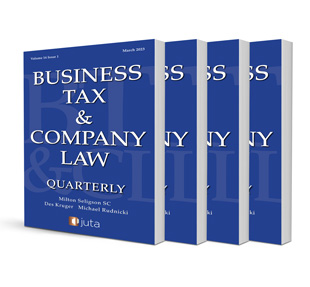Going Concern(ed): Potential Challenges in Sale-of-Business Transactions

Going Concern(ed): Potential Challenges in Sale-of-Business Transactions
Author: Siyabonga Nyezi
ISSN: 2219-1585
Affiliations: Attorney of the High Court of South Africa
Source: Business Tax & Company Law Quarterly, Volume 16 Issue 2, 2025, p. 1 – 8
Abstract
One of the fundamental tenets of any sale-of-business transaction is that the business to be transferred must be a going concern, and be transferred as such. Not only is the concept of a going concern given life in the provisions of a sale-of-business agreement, it is also found in various pieces of legislation that apply to the transfer of a business. Examples include the Value-Added Tax Act 89 of 1991, the Labour Relations Act 66 of 1995 and, to some extent, the Companies Act 71 of 2008. Each of these statutes contains provisions where the status of a business as a going concern is a key consideration. As such, one might expect that the term ‘going concern’ ought to be defined in each of these Acts. That assumption would be incorrect, as none of these statutes provide a direct and objective definition of the term ‘going concern’.
This article examines the absence of a definition for ‘going concern’ in South African legislation applicable to the transfer of a business, and the risks arising from the lack of legislative clarity. The article considers the relevant provisions of the aforenamed statues. Absent a legislative definition, the article examines the attempts made by the courts to defi ne the term ‘going concern’ in two cases, namely, Kopeledi (Pty) Ltd v Madontsela and Others (2009) 30 ILJ 158 (LC) and NEHAWU v University of Cape Town (2003) 24 ILJ 95 (CC), and the challenges resulting from those definitions.
Thirdly, the article also explores the approach taken in the International Accounting Standards (IAS), and discusses the challenges also present therein. The article submits that, despite being an internationally accepted set of standards, IAS is not particularly instructive to the present cause.
The article then delves into the potential impact of all these lacunae on sale-of-business transactions, and concludes with an attempt at legislative drafting, proffering a proposal for what a definition of ‘going concern’ might look like.